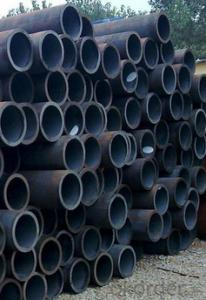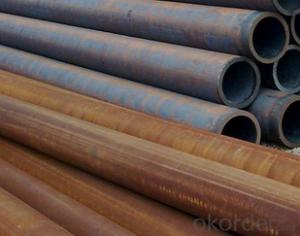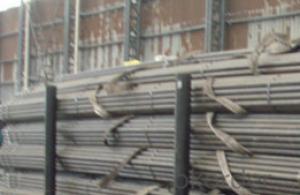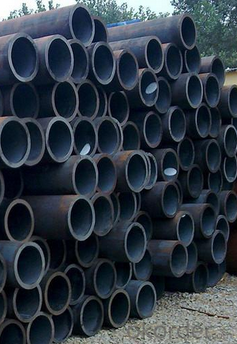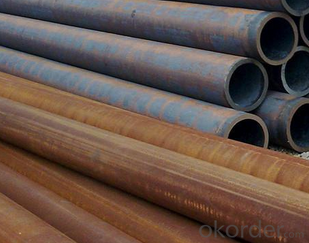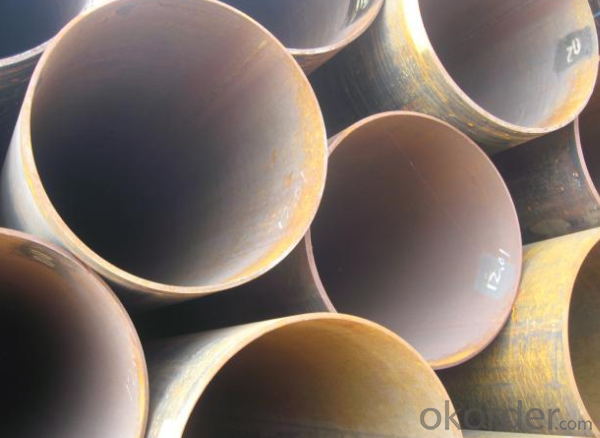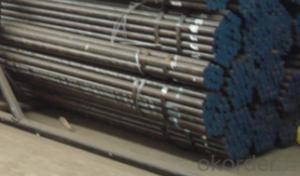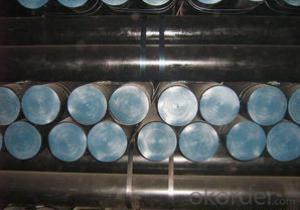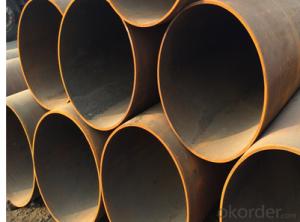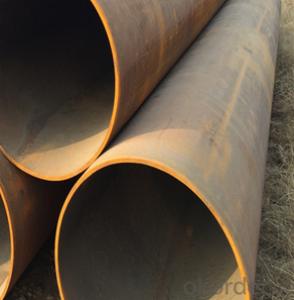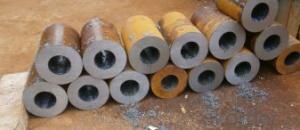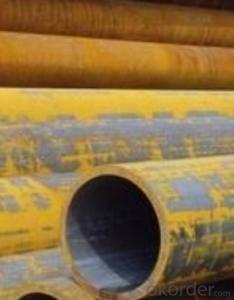Cold Drawn Carbon Steel Seamless Pipe P11 CNBM
- Loading Port:
- Qingdao
- Payment Terms:
- TT OR LC
- Min Order Qty:
- 10 pc
- Supply Capability:
- 30 pc/month
OKorder Service Pledge
OKorder Financial Service
You Might Also Like
Quick Details
| Thickness: | 1.2 - 20 mm | Section Shape: | Round | Outer Diameter: | 12.7 - 168 mm |
| Secondary Or Not: | Non-secondary | Application: | Boiler Pipe | ||
| Technique: | Cold Drawn | Certification: | PED | Surface Treatment: | oil coating |
| Special Pipe: | Thick Wall Pipe | Alloy Or Not: | Is Alloy | ASTM A213: | T2,T5,T9,T11,T12,T22,T23,T91,T91 |
| ASTM A335: | P1,P2,P5,P9,P11,P12,P22,P23,P91,P92 | DIN17175: | 15Mo3,10CrMo910,12CrMo195,13CrMo44 | Grade: | 12Cr1MoV,Cr5Mo,Cr9Mo,12Cr1MoVG,Cr5MoG,A335 P11,A335 P5,A335 P9,A335 P1,A213,A192,A210,A335 P12,A335 P23,St35.8,Cr-Mo alloy,A53-A369,ST35-ST52 |
| Standard: | BS 3059-2,DIN EN 10216-1-2004,DIN 17175,ASTM A213-2001,ANSI A210-1996,ASTM A179-1990,BS,DIN,ASTM |
Packaging & Delivery
| Packaging Detail: | Seaworthy export packing |
| Delivery Detail: | 45 Days |
Specifications
Standard:ASTM A179,DIN17175
Material:SA179,ST35.8
Size:12*1.2-168*20
Manufacture:cold drawn
Heat treating: normalized
Product Description
Commodity: cold drawn carbon steel seamless pipe
Standard&material: ASTM A213 T2,T5,T9,T11,T12,T22,T23,T91,T92, ASTM A335 P1,P2,P5,P9,P11,P12,P22,P23,P91,P92, DIN17175 15Mo3,10CrMo910,12CrMo195,13CrMo44, and equivalent standard and material.
Size range: 12mm*1.2mm - 168mm*20mm
Manufacture method: cold rolled, cold drawn
Delivery condition: Normalized, Normalized and Tempered.
Mill test certificate as per EN10204 3.1B is available.
Third party inspection is acceptable.
Tubes will be ECT+UT.
Packaging & Shipping
Packing: tubes will be packed in bundles tied with steel strips.
Oil coating,varnish,or black painting to be confirmed.
End plastic caps to be confirmed.
External packing by knit bags.
Marking: to be confirmed.
- Q: What are the different sizes of steel pipe nipples?
- The sizes of steel pipe nipples vary depending on their intended use and application. Common sizes include 1/8", 1/4", 3/8", 1/2", 3/4", 1", 1 1/4", 1 1/2", and 2". However, there are many other sizes available to cater to specific needs and requirements.
- Q: Can galvanized steel tubes simmer?
- Galvanized steel pipe can simmer bending.Is a set of bending bending bending die, no matter what kind of equipment, most are used in pipe, mainly used for oil and gas, infusion, more plays an important role in aircraft and engine.
- Q: What is the difference between steel pipe and tubing?
- Steel pipe and tubing are both used in various applications, but they have distinct differences. The primary difference between steel pipe and tubing lies in their shape and dimensions. Steel pipe is typically round in shape and has a hollow interior. It is manufactured in a variety of sizes and thicknesses to accommodate different pressure and temperature requirements. Steel pipe is commonly used in construction, plumbing, and oil and gas industries for conveying fluids or gases. On the other hand, steel tubing can come in various shapes, including round, square, and rectangular. Unlike steel pipe, tubing is often measured by its outside diameter and wall thickness. Steel tubing is commonly used in structural applications, such as building frames, automotive components, and machinery. Another difference between steel pipe and tubing is their manufacturing process. Steel pipe is typically made from solid steel billets that are heated and stretched to create a seamless or welded tube. Tubing, on the other hand, can be produced through various methods, including hot or cold rolling, welding, or extrusion. In terms of strength and durability, both steel pipe and tubing offer excellent qualities. However, the specific requirements of the application will determine which one is more suitable. Steel pipe is often chosen for high-pressure or high-temperature applications, while steel tubing is preferred for structural purposes or when a specific shape is required. In summary, the main difference between steel pipe and tubing lies in their shape, measurement methods, and manufacturing processes. While steel pipe is round and measured by its inside diameter, tubing can come in various shapes and is typically measured by its outside diameter. Both steel pipe and tubing are widely used in different industries, but the choice depends on the specific application and requirements.
- Q: How are steel pipes used in the manufacturing of furniture and appliances?
- Steel pipes are commonly used in the manufacturing of furniture and appliances due to their strength, durability, and versatility. One of the main uses of steel pipes in furniture manufacturing is for constructing the frames or structures of various pieces, such as chairs, tables, and beds. These pipes are often used as the primary support system, providing a sturdy and reliable foundation for the furniture. In appliances, steel pipes are utilized for various purposes. They are commonly employed in the manufacturing of kitchen appliances, such as stoves, ovens, and refrigerators, to create the internal framework and support the weight of the appliance. Steel pipes are also frequently used in the production of washing machines, dryers, and dishwashers to transport water and other fluids throughout the appliance. Furthermore, steel pipes are utilized in the manufacturing of outdoor furniture and equipment, where weather resistance and durability are crucial. These pipes are often coated with protective materials to prevent rust and corrosion, ensuring the longevity of the furniture and appliances. Overall, steel pipes play a vital role in the manufacturing of furniture and appliances, providing the necessary strength and support required for these items. Their versatility allows for various applications, making them an essential component in the production process of these goods.
- Q: How are steel pipes tested for leaks?
- Steel pipes are typically tested for leaks using various methods such as hydrostatic testing, pneumatic testing, or advanced technologies like ultrasonic testing. In hydrostatic testing, the pipe is filled with water or another liquid, and pressure is applied to check for any leaks. Pneumatic testing involves using compressed air or gas to pressurize the pipe and identify potential leaks. Ultrasonic testing employs high-frequency sound waves to detect any leaks or flaws in the steel pipes. These testing methods ensure the integrity and quality of steel pipes before they are put into use.
- Q: Are steel pipes suitable for fire protection systems?
- Yes, steel pipes are suitable for fire protection systems. They are highly durable and have excellent resistance to heat and fire. Steel pipes also have superior strength, making them suitable for carrying water or other fire suppressants at high pressure. Additionally, steel pipes have a long lifespan and are able to withstand different environmental conditions, making them a reliable choice for fire protection systems.
- Q: What are the different grades of steel used for pipes?
- The different grades of steel used for pipes include carbon steel, alloy steel, and stainless steel.
- Q: Where is the difference between seamless steel pipe and welded pipe?
- Seamless steel tube is formed during rolling. Welded steel pipes need to be welded after coiling, and spiral welding and direct welding are generally used. Seamless performance is better, of course, the price is higher.
- Q: What are the different types of coatings used on steel pipes?
- There are several types of coatings that are commonly used on steel pipes to enhance their durability and protect them from corrosion. Some of the most common types of coatings include: 1. Fusion-Bonded Epoxy (FBE) Coating: This coating is applied to the steel pipe through a process of heating and melting the epoxy powder, which then fuses to the surface. FBE coatings provide excellent corrosion resistance and are commonly used in water pipelines and oil and gas industries. 2. Polyethylene (PE) Coating: PE coatings are applied to steel pipes using a similar process as FBE coatings. PE coatings provide a protective layer that is resistant to moisture, chemicals, and abrasion. They are commonly used in gas pipelines and underground water pipelines. 3. Polypropylene (PP) Coating: PP coatings are similar to PE coatings in terms of their application process and protective qualities. However, PP coatings offer enhanced resistance to higher temperatures, making them suitable for applications such as chemical processing plants and refineries. 4. Concrete Weight Coating (CWC): CWC is a special coating that involves applying a layer of concrete to the steel pipe. This coating provides additional weight to the pipe, making it more stable and resistant to buoyancy in underwater or submerged applications. 5. Zinc Coating: Zinc coatings, such as hot-dip galvanizing, involve immersing the steel pipe in a bath of molten zinc. This process creates a protective layer of zinc on the surface of the pipe, offering excellent corrosion resistance. Zinc coatings are commonly used in outdoor applications, such as fencing, guardrails, and water pipelines. 6. Bituminous Coating: Bituminous coatings involve applying a layer of bitumen or asphalt to the steel pipe. This coating provides excellent resistance to water and chemicals, making it suitable for underground pipelines and structures. These are just a few examples of the different types of coatings used on steel pipes. The choice of coating depends on factors such as the intended application, environmental conditions, and the level of corrosion resistance required.
- Q: Can steel pipes be used for underground utility lines?
- Yes, steel pipes can be used for underground utility lines. Steel pipes are commonly used for various underground applications, including water, gas, and oil pipelines. They are known for their strength, durability, and resistance to corrosion, making them suitable for underground installations where protection against external elements is required. Additionally, steel pipes are often used in areas with high traffic loads or areas prone to natural disasters, as they provide excellent structural integrity and can withstand heavy loads and external pressures.
Send your message to us
Cold Drawn Carbon Steel Seamless Pipe P11 CNBM
- Loading Port:
- Qingdao
- Payment Terms:
- TT OR LC
- Min Order Qty:
- 10 pc
- Supply Capability:
- 30 pc/month
OKorder Service Pledge
OKorder Financial Service
Similar products
Hot products
Hot Searches
Related keywords
